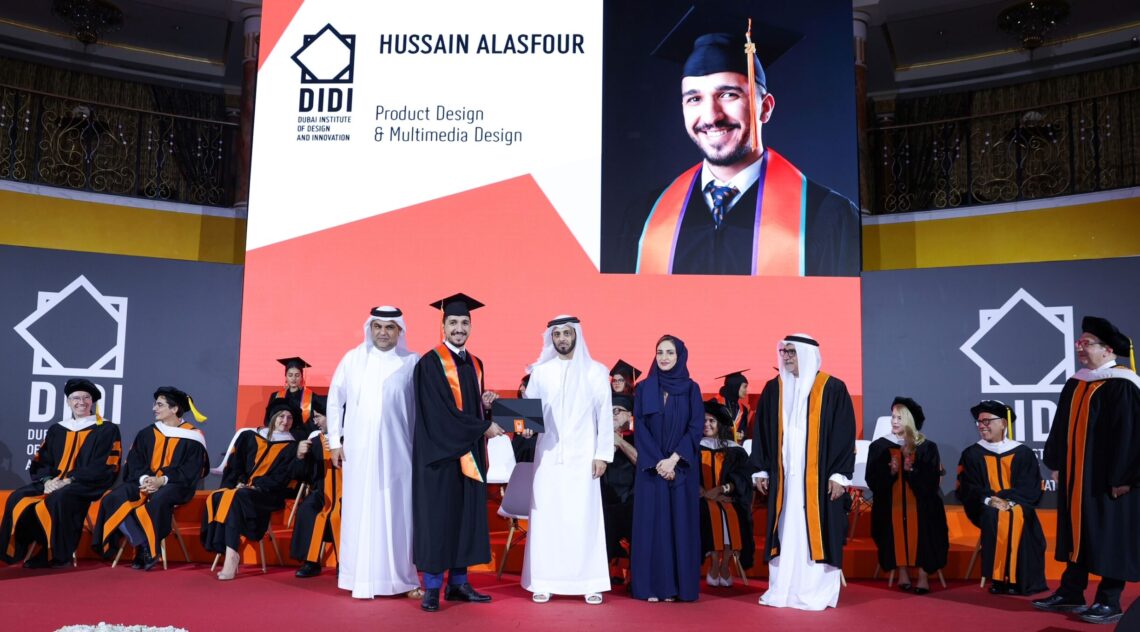
The Dubai Institute of Design and Innovation (DIDI) celebrated the graduates of its Class of 2024 at the prestigious Burj Al Arab, amidst the cheers of families, friends, and distinguished guests. The event was attended by the presence of Malek Al Malek, Chairman of Board of Directors DIDI alongside board members, industry partners, and the DIDI administration and staff.
The graduates, exemplifying their class slogan “Designers on another level,” showcased their readiness to escalate their careers with an impressive graduate exhibition. This exhibit presents an array of prototypes, theses, and projects that delve into artificial intelligence, wearable tech, sustainability, Emirati heritage, and innovative cross-sector technological solutions addressing healthcare, mobility, and food security. This display represents the wide-ranging applications of design and marks a significant prelude to the multidisciplinary Bachelor of Design degree aimed at nurturing a new generation of designers, innovators, and entrepreneurs in the Mena region and beyond.
The Graduate Exhibition is a cornerstone event in DIDI’s annual calendar, where senior-year students demonstrate the culmination of four years of intensive design thinking and product development, forming the core of their graduating thesis. This celebration not only marks a significant milestone for the graduates but also a reaffirmation of DIDI’s commitment to advancing the field of design education in the region.
“The demands of the modern workplace are changing the face of academia. It’s not theory and lectures alone that cultivateinnovative thinkers—it’s challenging them to translate knowledge into practice,” said Mohammad Abdullah, President of DIDI. “The graduates embody the DNA of our university, their empathy and commitment to bettering our world through design is evident in each of the capstone projects”. Commenting about the culturally rooted Emirati students’ projects, “we have projects preserving the traditions of Emirati hospitality through furniture, the preservation of our Arabic language through design and the ways fashion can connect communities back to their roots”.
Dubai is one of the world’s most dynamic, resilient, and future-ready cities. Besides empowering and replenishing the creative economy with skilled talent, as per the National Strategy for the Cultural and Creative Industries, DIDI’s approach to design thinking and teaching furthers the UAE’s mounting focus on artificial intelligence and technological innovation. AI is becoming a strategic priority for the government, as it stands to transform vital economic sectors and contribute up to $15.7 trillion to the global economy in 2030, reports PwC.
Dr Amir Zeid, Dean of DIDI, said, “The Capstone projects displayed this year not only represent DIDI’s educational journey but also deeply reflect the values, aspirations, and concerns of younger generations. From projects on sustainability and personalised healthcare to preserving Emirati heritage, mobility and urban development, the Graduate Exhibition represents projects that add value and reshape the future socially, digitally, and creatively—and well beyond the creative industries. This graduating cohort demonstrates that creativity is the way of the digital world and how essential design thinking is to its inclusive and sustainable development.”
One project ondisplay at the 2024 Graduate Exhibition leverages artificial intelligence to empower people suffering from memory loss, using advanced technology to enhance memory retention and facilitate social interactions. Another student formulated an AI assistant to support adults with ADHD in managing daily life andcomplex social environments.
Design applications in the healthcare industry are equally prominent this year. One DIDI student explored alternative technologies for individuals with vision loss or impairment, while another investigated the potential of leveraging wearables and smart home technologies to manage epilepsy and improve a patient’s quality of life.
A key theme in the global design industry, sustainability also played a significant part in this year’s capstone projects. One project displayed at the exhibition suggests an environmentally-friendly alternative to sequins and glitter for fashion use—which, in their current form, contribute to plastic pollution—alongside a peer who, using field surveys, community research and visual mapping on Saadiyat Island in Abu Dhabi, investigated the relationship between urban development and local biodiversity, with a focus on the Arabian Gazelle.
The university’s Bachelor of Design (BDes) course incorporates four disciplines: Product Design, Multimedia Design, Fashion Design, and Strategic Design Management. This cross-concentration path allows students to seamlessly blur the boundaries between traditional fields of design, increasing their ability to practice empathy, solve complex problems, think critically, and develop heightened emotional intelligence.